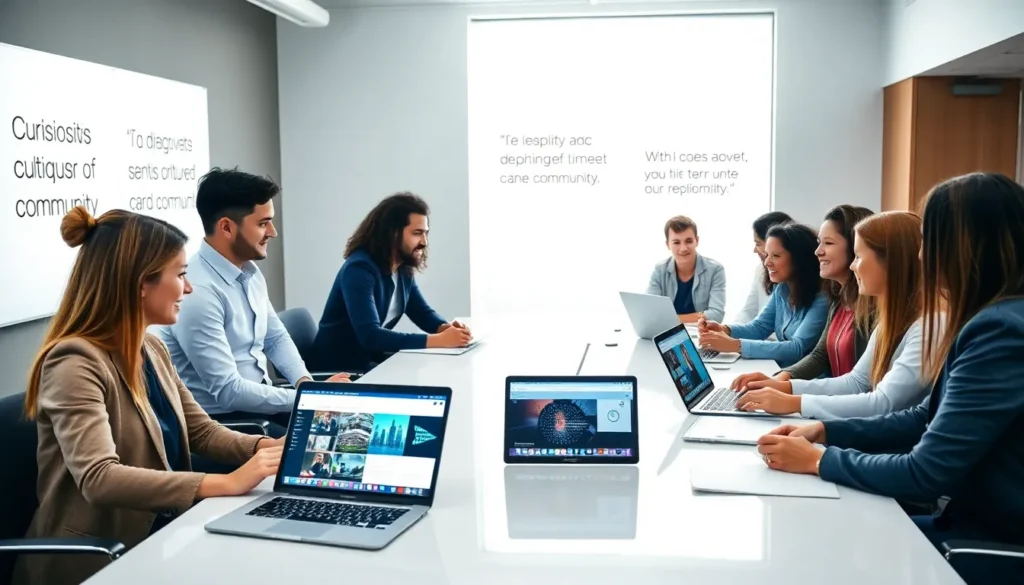In today’s tech-savvy world, mobile apps for schools are like the secret sauce that turns a bland educational experience into a gourmet feast. Imagine juggling homework, schedules, and parent-teacher meetings all while trying to find that elusive sock your kid lost—oh, the joys of parenthood! Thankfully, these apps swoop in like superheroes, making life a whole lot easier for students, teachers, and parents alike.
From streamlining communication to tracking assignments, these digital tools not only save time but also keep everyone connected. Whether it’s a quirky quiz app or a robust learning management system, there’s something out there for every school’s unique needs. So, buckle up and get ready to explore the world of mobile apps that are transforming classrooms into vibrant hubs of learning and collaboration.
Table of Contents
ToggleOverview Of Mobile Apps For Schools
Mobile apps play a crucial role in modern education, enhancing the learning experience for students, teachers, and parents. They streamline tasks and improve communication within the school community.
Importance Of Mobile Apps In Education
Mobile apps boost engagement through interactive learning experiences. They enable immediate feedback, encouraging students to stay motivated. Teachers benefit from improved organizational tools, allowing them to manage classes efficiently. Real-time communication with parents fosters stronger relationships, promoting a supportive learning environment. Accessibility remains a key feature; students with disabilities often find additional resources that cater to their needs. These characteristics illustrate how mobile apps serve as essential tools in transforming traditional teaching methods.
Key Features To Look For
Look for user-friendly interfaces that promote seamless navigation. Integration with existing school systems ensures compatibility and reduces administrative work. Communication tools that facilitate messaging between teachers, students, and parents enhance collaboration. Access to educational resources, such as quizzes, videos, and assignments, enriches the learning experience. Finally, robust security measures protect user data, ensuring a safe digital environment for all users. These features form the backbone of effective educational mobile apps.
Popular Mobile Apps For Schools

Mobile apps enhance education by streamlining communication and learning management. Various applications support collaboration among students, teachers, and parents while customizing educational experiences.
Communication Apps
Communication apps serve as essential tools for interaction in educational settings. Examples include Remind, which streamlines messages between teachers and parents, and ClassDojo, fostering community through updates and feedback. These platforms promote real-time communication, allowing parents to stay informed about their child’s progress. Additionally, GroupMe helps students form study groups, encouraging collaboration outside the classroom. Utilizing such apps enhances engagement and strengthens relationships within the school community.
Learning Management Systems (LMS)
Learning management systems (LMS) facilitate course organization and content delivery. Popular options encompass Google Classroom and Schoology, which provide streamlined access to assignments, resources, and grades. Both platforms enable teachers to create dynamic learning environments tailored to student needs. They also support tracking student progress and integrating additional educational tools. Utilizing an LMS boosts efficiency within educational settings and promotes student accountability through organized access to materials.
Benefits Of Using Mobile Apps In Schools
Mobile apps play a vital role in modern education, offering numerous advantages for students, teachers, and parents alike.
Enhancing Student Engagement
Interactive features boost student interest and participation. Apps that include quizzes and gamified learning motivate students to engage with the material actively. Real-time feedback helps learners stay on track and recognize their strengths and weaknesses. Visual learning tools enrich comprehension, catering to different learning styles. Collaborative projects through apps enhance teamwork and problem-solving skills. Consistently, these features create an immersive educational environment where students thrive.
Facilitating Parental Involvement
Mobile apps streamline communication between parents and teachers. Instant updates on assignments and grades keep parents informed of their child’s progress. Notifications about school events encourage participation in the school community. Furthermore, platforms supporting two-way communication foster stronger relationships, allowing parents to ask questions and provide feedback. Accessible resources equip parents with tools to support learning at home. Overall, these apps promote a collaborative approach to education.
Challenges Of Implementing Mobile Apps
Implementing mobile apps in schools presents several challenges that educators and administrators must navigate. These challenges can impact the effectiveness of mobile technology in enhancing the educational experience.
Accessibility Issues
Accessibility issues arise when mobile apps don’t support all students. Students with disabilities may struggle to use apps lacking essential features like screen readers or customizable interfaces. Developers should prioritize designing apps that meet the needs of diverse learners. Regulations like the Americans with Disabilities Act mandate compliance, ensuring equal access to educational resources. Schools must assess app accessibility and provide alternatives where necessary.
Training And Support
Training and support play a crucial role in the successful implementation of mobile apps in educational settings. Teachers and staff must receive adequate training to use the apps effectively. This includes understanding features, troubleshooting issues, and integrating apps into lesson plans. Continuous support is essential for addressing questions and challenges that may arise during usage. Schools should allocate resources for ongoing training sessions and workshops to keep staff updated on app functionalities.
Mobile apps are revolutionizing the educational landscape by fostering engagement and collaboration among students, teachers, and parents. These tools not only simplify communication but also provide a platform for personalized learning experiences. As schools continue to embrace technology, the integration of user-friendly and accessible apps becomes vital for enhancing the overall educational experience.
Investing in the right mobile applications can lead to improved organization and stronger relationships within the school community. With a focus on inclusivity and continuous support for educators, mobile apps can bridge gaps in traditional teaching methods and create dynamic learning environments. The future of education lies in harnessing these digital solutions to empower every learner.









